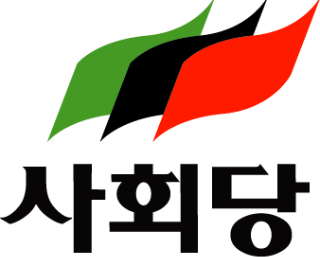Related Research Articles

The politics of Kenya take place in a framework of a presidential representative democratic republic, whereby the President of Kenya is both head of state and head of government, and of a multi-party system in accordance with a new constitution passed in 2010.

The Kenya African National Union (KANU) is a Kenyan political party that ruled for nearly 40 years after Kenya's independence from British colonial rule in 1963 until its electoral loss in 2002. It was known as Kenya African Union (KAU) from 1944 to 1952. The KAU was banned by the colonial government from 1952 to 1960. It was re-established by James Gichuru in 1960 and renamed KANU on 14 May 1960 after a merger with Tom Mboya's Kenya Independence Movement.

The Political Parties, Elections and Referendums Act 2000 is an Act of Parliament of the United Kingdom that sets out how political parties, elections and referendums are to be regulated in the United Kingdom. It formed an important part of the constitutional reform programme implemented by the 1997 Labour Government, building on the Registration of Political Parties Act 1998 which was passed two years earlier.
The Kiwi Party was a political party operating in New Zealand between 2007 and 2011. Briefly known as Future New Zealand, it was a breakaway from the United Future New Zealand party and sought to carry on the tradition of Future New Zealand. The party was formed when MP Gordon Copeland left United Future after a dispute over support for the Crimes Amendment Act 2007. At the 2008 general election, the Kiwi Party was unsuccessful, and was not re-elected to Parliament. It did not contest the 2011 general election under its own banner, but the leaders and other members stood for the Conservative Party.

The youth vote in the United States is the cohort of 18–24 year-olds as a voting demographic. Many policy areas specifically affect the youth of the United States, such as education issues and the juvenile justice system. The general trend in voter turnout for American elections has been decreasing for all age groups, but "young people's participation has taken the biggest nosedive". This low youth turnout is part of the generational trend of voting activity. Young people have the lowest turnout, though as the individual ages, turnout increases to a peak at the age of 50 and then falls again. Ever since 18-year-olds were given the right to vote in 1972, youth have been under represented at the polls as of 2003. In 1976, one of the first elections in which 18-year-olds were able to vote, 18–24 year-olds made up 18 percent of all eligible voters in America, but only 13 percent of the actual voters – an under-representation of one-third. In the next election in 1978, youth were under-represented by 50 percent. "Seven out of ten young people…did not vote in the 1996 presidential election… 20 percent below the general turnout." In 1998, out of the 13 percent of eligible youth voters in America, only five percent voted. During the competitive presidential race of 2000, 36 percent of youth turned out to vote and in 2004, the "banner year in the history of youth voting," 47 percent of the American youth voted. In the Democratic primaries for the 2008 U.S. presidential election, the number of youth voters tripled and even quadrupled in some states compared to the 2004 elections. In 2008, Barack Obama spoke about the contributions of young people to his election campaign outside of just voter turnout.
The Orange Democratic Movement (ODM) is a centre-left political party in Kenya. It is the successor of a grassroots people's movement which was formed during the 2005 Kenyan constitutional referendum campaign. This movement separated in August 2007 into the Orange Democratic Movement Party of Kenya and the Wiper Democratic Movement – Kenya.

Socialist Party was a minor left-wing political party in South Korea, founded in 1998. It advocated an ideology of socialism, social republicanism, peace and environmentalism.

The National Rainbow Coalition–Kenya (NARC–Kenya) is a political party in Kenya. The party was formed after the defeat of the Government sponsored Draft constitution. It was formed by National Rainbow Coalition members loyal to the government. The party, though months old, captured 3 parliamentary seats and 2 Civic seats in the by-elections of 24 July 2006 that are seen as a litmus test for the upcoming general elections for which the new party was planned to play a major role in securing reelection for president Kibaki.

Voter registration in the United States is required for voting in federal, state and local elections in the United States. The only exception is North Dakota, although cities in North Dakota may register voters for city elections. Voter registration takes place at the county level in many states and at the municipal level in several states. Most states set cutoff dates for voter registration and to update details, ranging from 2 to 4 weeks before an election; while a third of states have Election Day or "same-day" voter registration which enables eligible citizens to register or update their registration when they vote before or on election day.
Young Front is a Belarusian youth movement registered in the Czech Republic. It is the largest youth organisation of Belarus declaring democratic values. It is a member of the European Democrat Students.

The Party of National Unity (PNU) is a political party in Kenya originally founded as a political coalition. On 16 September 2007, Kenyan President Mwai Kibaki announced the party formation and said that he would run as its presidential candidate in the December 2007 Kenyan elections. It has since become a political party in its own right following conditions set by the Political Parties Act, passed in Kenya in 2008. Recently PNU has launched activities to revamp itself ahead of the 2022 general elections.

General elections were held in Kenya on 27 December 2007. Voters elected the President, and members of the National Assembly. They coincided with the 2007 Kenyan local elections.
Majimbo is a Swahili term that is commonly used in Kenya to refer to the idea of political devolution of power to the country's regions. It is alleged by critics, including former vice-president Oginga Odinga in his book Not Yet Uhuru, to have been coined by European settlers in Kenya's White Highlands region, around the time of independence in 1963, who preferred to retain an autonomous, ethnically-based governance over the region. It has also been alleged, by some of its critics, that majimbo is a pretext for the type of communal violence that has plagued Kenya's elections especially since the return of multiparty politics. In his autobiography Illusions of Power, G.G Kariuki, a long serving KANU Member of Parliament, goes as far as to allege the existence of a plot to instigate communal violence in Kenya's independence elections by supporters of a Majimbo system of government.

General elections were held in Kenya on 4 March 2013. Voters elected the President, members of the National Assembly and newly formed Senate. They were the first elections held under the new constitution, which was approved in a 2010 referendum, and were also the first run by the new Independent Electoral and Boundaries Commission (IEBC). They coincided with the 2013 Kenyan local elections.
The Mana Movement, formerly known as the Mana Party, is an unregistered New Zealand political party led by Hone Harawira which was formed in April 2011 following his resignation from the Māori Party. Harawira won the by-election in Te Tai Tokerau of 25 June 2011 for the Mana Party and retained the seat during the 2011 general election, but lost it in 2014 and 2017 to Labour Party candidate Kelvin Davis.
The Truth, Justice and Reconciliation Commission of Kenya (TJRC) was established in 2008. Kenya’s modern history has been marked not only by liberation struggles but also by ethnic conflicts, semi-despotic regimes, marginalization and political violence, including the coup d'état of 1982, the Shifta War, and the 2007 Post-election violence.

Governorate or provincial elections were held in Iraq on 20 April 2013, to replace the local councils in the governorates of Iraq that were elected in the Iraqi governorate elections of 2009. Elections took place in 12 of Iraq's 18 governorates. Elections didn't take place in the 3 governorates forming the Kurdistan Region or Kirkuk, Anbar, or Nineveh, meaning that a total of 378 provincial council seats were up for election.

The Jubilee Party of Kenya is the ruling political party of the Republic of Kenya. The party was founded on 8 September 2016, following the merger of 11 smaller parties. During the 2017 election, the Jubilee Party secured a plurality of seats in Parliament and the party leader, Uhuru Kenyatta, was re-elected president. Since January 2019, the party's stability has been threatened by growing infighting.